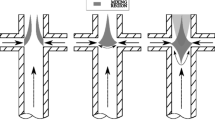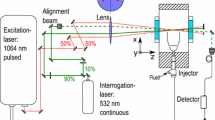Abstract
Previous researchers have demonstrated that strong pulsations of the fuel flow rate can significantly reduce the flame length and luminosity of laminar/transitional non-premixed jet flames. The physical mechanisms responsible for these changes are investigated experimentally in acoustically-forced jet flows where the peak velocity fluctuations are up to eight times the mean flow velocity. Both reacting and non-reacting flows were studied and Reynolds numbers, based on the mean flow properties, ranged from 800 to 10,000 (corresponding to peak Reynolds numbers of 1,450–23,000), and forcing frequencies ranged from 290 to 1,140 Hz. Both the first and second organ-pipe resonance modes of the fuel delivery tube were excited to obtain these frequencies. An analysis of the acoustic forcing characteristics within the resonance tube is provided in order to understand the source of the high amplitude forcing. Flow visualization of jets with first resonant forcing confirms the presence of large-scale coherent vortices and strong reverse flow near the exit of the fuel tube. With second-resonant forcing, however, vortices are not emitted from the tube as they are drawn back into the fuel tube before they can fully form. Increased fine-scale turbulence is associated with both resonant cases, but particularly at second resonance. The power spectra of the velocity fluctuations for a resonantly pulsed jet show the presence of an inertial subrange indicating that the flow becomes fully turbulent even for mean-Reynolds-number jets that are nominally laminar. It is shown that these pulsed jet flows exhibit strong similarities to synthetic jets and that the Strouhal number, based on the maximum velocity at the fuel tube exit, is the dominant parameter for scaling these flows. The Strouhal number determines the downstream location where the coherent vortices breakdown, and is found to provide better collapse of flame length data (both current and previous) than other parameters that have been used in the literature.






















Similar content being viewed by others
References
Becker HA, Liang D (1978) Visible length of vertical free turbulent diffusion flames. Combust Flame 32:123–149
Becker HA, Yamazaki S (1978) Entrainment, momentum flux and temperature in vertical free turbulent diffusion flames. Combust Flame 33(2):123–149
Bisetti F, Ezekoye OA, Clemens NT (2003) Flame length and exit plane mixing in resonantly excited jet diffusion flames. In: Proceedings of the 6th ASME-JSME thermal engineering joint conference, Hawaii island, Hawaii
Blackstock DT (2000) Fundamentals of physical acoustics, 1st edn. Wiley, New York
Cater JE, Soria J (2002) The evolution of round zero-net-mass-flux jets. J Fluid Mech 472:167–200
Delabroy O, Lacas F, Poinsot T, Candel S, Hoffmann T, Hermann J, Gleis S, Vortmeyer D (1996) A study of nox reduction by acoustic excitation in a liquid fueled burner. Combust Sci Technol 119:397–408
Demare D, Baillot F (2004) Acoustic enhancement of combustion in lifted nonpremixed jet flames. Combust Flame 139(4):312–328
Ezekoye OA, Martin KM, Bisetti F (2005) Pulsed flow modulation of soot production in a laminar jet diffusion flame. Proc Combust Inst 30(1):1485–1492
Gharib M, Rambod E, Shariff K (1998) A universal time scale for vortex ring formation. J Fluid Mech 360:121–140
Glezer A, Amitay M (2002) Synthetic jets. Annu Rev Fluid Mech 34:503–529
Gutmark E, Parr TP, Hanson-Parr DM, Schadow KC (1989) On the role of large and small scale structures in combustion control. Combust Sci Technol 66:107–126
Gutmark E, Parr TP, Hanson-Parr DM, Schadow KC (1990) Use of chemiluminescence and neural networks in active combustion control. Proc Combust Inst 23:1101–1106
Gutmark E, Parr TP, Hanson-Parr DM, Schadow KC (1992) Structure of a controlled ducted flame. Combust Sci Technol 87:217–239
Hardalupas Y, Selbach A (2002) Imposed oscillations and non-premixed flames. Prog Energy Combust Sci 28(1):75–104
Hermanson JC, Dugnani R, Johari H (2000) Structure and flame length of fully-modulated, pulsed diffusion flames. Combust Sci Technol 155:203–225
Hermanson JC, Johari H, Stocker DP, Hegde UG (2004) Buoyancy effects in strongly pulsed turbulent diffusion flames. Combust Flame 139(1–2):61–76
Ingard U, Singhal VK (1975) Effect of flow on the acoustic resonances of an open-ended duct. J Acous Soc Am 58:788–793
Johari H, Motevalli V (1993) Flame length measurements in burning fuel puffs. Combust Sci Technol 94:229–244
Kaplan CR, Shaddix CR, Smyth KC (1996) Computations of enhanced soot production in time-varying methane/air diffusion flames. Combust Flame 106:392–405
Keller JO, Hongo I (1990) Pulse combustion: the mechanisms of nox production. Combust Flame 80:219–237
Keller JO, Eibeck PA, Bramlette TT, Barr PK (1993) Pulsed combustion: tailpipe exit jet characteristics. Combust Sci Technol 94:167–192
Kim JK, Shin HD (1997) Limit of equivalence ratio on mixing enhancement near the tube exit in a tone exited rich flame. Int J Energy Res 21:377–383
Kim TK, Park J, Shin HD (1993) Mixing mechanism near the nozzle exit in a tone excited non-premixed jet flame. Combust Sci Technol 89:83–100
Lighthill MJ (1962) Sound generated aerodynamically. Proc R Soc Lond A 267:147–182
Lovett JA, Turns SR (1990) Experiments on axisymmetrically pulsed turbulent jet flames. AIAA J 28:38–46
Lovett JA, Turns SR (1993) The structure of pulsed turbulent nonpremixed jet flames. Combust Sci Technol 94:193–216
Milne EA, Fowler RH (1921) Siren harmonics and pure tone siren. Proc R Soc Lond A 98:414–427
Morse PM, Ingard KU (1968) Theoretical acoustics. McGraw-Hill, New York
Muniz L, Mungal MG (2001) Effects of heat release and buoyancy on flow structure and entrainment in turbulent nonpremixed flames. Combust Flame 126(1–2):1402–1420
Muramatsu A, Era Y (2003) Mixing of carbon dioxide gas and air by a pulsating jet with a reversed flow. In: Proceedings of the 4th ASME-JSME joint fluids engineering conference, Honolulu, Hawaii
Oh SK, Shin HD (1998) A visualization study on the effect of forcing amplitude on tone-excited isothermal jets and jet diffusion flames. Int J Energy Res 22:343–354
Papadapoulos G, Bryant RA, Pitts WM (2002) Flow characterization of flickering methane/air diffusion flames using particle image velocimetry. Exp Fluids 33:472–481
Parikh PG, Moffat RJ (1982) Resonant entrainment of a confined pulsed jets. J Fluid Eng Trans ASME 104(4):482–488
Rediniotis OK, Ko J, Yue X, Kurdila AJ (1999) Synthetic jets, their reduced order modeling and applications to flow control. In: AIAA paper 99-1000 at the 37th Aerospace Sciences Meeting and Exhibit, Reno
Ritchie BD, Mujumdar DR, Seitzman JM (2000) Mixing in coaxial jets using synthetic jet actuators. In: AIAA paper 2000-0404 at the 38th AIAA Aerospace Sciences Meeting, Reno
Shaddix CR, Harrington JE, Smyth KC (1994) Quantitative measurements of enhanced soot production in a flickering methane/air diffusion flame. Combust Flame 99(3–4):723–732
Smith BL, Glezer A (1998) The formation and evolution of synthetic jets. Phys Fluids 10:2281–2297
Smyth KC, Harrington JE, Johnsson EL, Pitts WM (1993) Greatly enhanced soot scattering in flickering methane/air diffusion flames. Combust Flame 95(1–2):229–239
Strawa AW, Cantwell BJ (1985) Visualization of the structure of a pulsed methane/air diffusion flame. Phys Fluids 28(8):2317–2320
Strayer BA, Dunn-Rankin D, Jabbari F (1998) Comparison between frequency and amplitude modulated adaptive modulated adaptive control of a non-premixed flame. Proc Combust Inst 27(1):1247–1254
Tang YM, Waldherr G, Jagoda JI, Zinn BT (1995) Heat release timing in a non-premixed helmholtz pulse combustor. Combust Flame 100:251–261
Yang P, Seitzman JM (2003) Soot concentration and velocity measurement in an acoustic burner. In: AIAA paper 2003-1014 at the 41st Aerospace Sciences Meeting and Exhibit, Reno
Yule AJ (1978) Large-scale structure in the mixing layer of the round jet. J Fluid Mech 89:413–432
Zanker KJ (1970) Review of the work of j.l. hodgson on the measurement of pulsating flow. Meas Controls 3:125–140
Zinn BT (1992) Pulse combustion: recent applications and research issues. Proc Combust Inst 24:1297–1305
Acknowledgements
This work was sponsored by the U.S. National Science Foundation under grant CTS-0308589. The authors would like to thank Dr. Idicheria and Mr. Gamba for helping with the experiments.
Author information
Authors and Affiliations
Corresponding author
Rights and permissions
About this article
Cite this article
Lakshminarasimhan, K., Clemens, N.T. & Ezekoye, O.A. Characteristics of strongly-forced turbulent jets and non-premixed jet flames. Exp Fluids 41, 523–542 (2006). https://doi.org/10.1007/s00348-006-0164-3
Received:
Revised:
Accepted:
Published:
Issue Date:
DOI: https://doi.org/10.1007/s00348-006-0164-3




